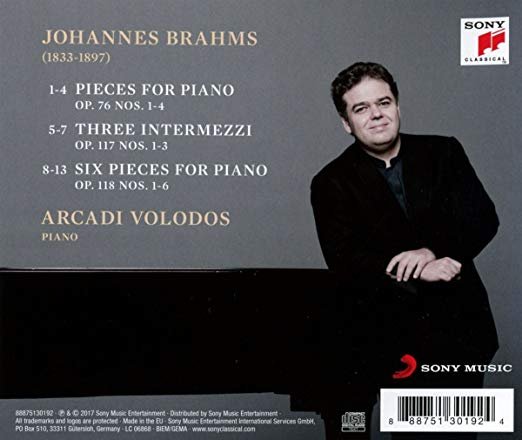What are you currently listening to (Classical)?
- Thread starter Bachtoven
- Start date
You are using an out of date browser. It may not display this or other websites correctly.
You should upgrade or use an alternative browser.
You should upgrade or use an alternative browser.
This is my first exposure to his music--it's very enjoyable. Sort of like Scarlatti but perhaps with a bit more meat on his bones! Excellent playing and sound.


This is a wonderful new release. Fantastic playing and sound (Qobuz 24/192).


Aside from the Romantic Orchestral masterpieces, I often listen to Romantic piano. Here's one I can't stop playing lately. The Brahms symphonies need no introduction, but I really didn't appreciate Brahms truly was among the most highly regarded of all the "12-tone" piano composers. This disc showcases his masterful piano compositions beautifully. Gorgeous pianism by Volodos as well. I have the CD but Qobuz 24/96 is its equal or perhaps a wee bit better in the lower register than the CD burned to my NAS drive. Thoroughly wonderful disc, well recorded by Sony in the Berlin Teldec studio.




I've enjoyed this via Tidal, so I bought a hi-res (24/96) FLAC version--there's no comparison in sound--the FLAC is vastly more transparent, detailed, and dynamic. Of course, the playing remains at the same great level.


To all you Classical fiends out there, I have a question:
My system, with Avant Grade Horns, almost too often renders male opera singers with a somewhat harsh glare.
Female voices are almost always great. In fact the male classical voice is the only instrument my speakers have
a problem with.
This is pretty frustrating and I wonder if there is quality to the male operatic voice that is hard for mikes to capture
without glare? Or perhaps it's an unfortunate combination with my horn speakers?
Anyone else run into this problem?
Thanks

My system, with Avant Grade Horns, almost too often renders male opera singers with a somewhat harsh glare.
Female voices are almost always great. In fact the male classical voice is the only instrument my speakers have
a problem with.
This is pretty frustrating and I wonder if there is quality to the male operatic voice that is hard for mikes to capture
without glare? Or perhaps it's an unfortunate combination with my horn speakers?
Anyone else run into this problem?
Thanks

To all you Classical fiends out there, I have a question:
My system, with Avant Grade Horns, almost too often renders male opera singers with a somewhat harsh glare.
Female voices are almost always great. In fact the male classical voice is the only instrument my speakers have
a problem with.
This is pretty frustrating and I wonder if there is quality to the male operatic voice that is hard for mikes to capture
without glare? Or perhaps it's an unfortunate combination with my horn speakers?
Anyone else run into this problem?
Thanks
What do you mean by harsh glare? A metallic shoutiness when the singer raises his voice loudly? That can very well be a characteristic of the voice itself, I have heard it live, without microphone. It's not necessarily always the case, or at least not always to a large extent. If your system/speakers introduce additional colorations is impossible to tell without hearing it.
Metallic might be a good adjective to add to glare. And it's definitely worsened when the singer is really belting out intense air. In the case of Debussy's Peleus and Mellisande, it's only the bass baritone playing Count Golard who has the uncomfortable glare in his voice. The baritone for Peleus and the two other bass vocalists are fine. The mezzo soprano is perfect.
I heard this opera at the Lincoln Center and did not hear the glare in Golard's voice.
My hunch is that microphones have a hard time with the intensity of some classical male voices and my horn speakers don't anything to tame what the mike picks up. It's a shame.
I heard this opera at the Lincoln Center and did not hear the glare in Golard's voice.
My hunch is that microphones have a hard time with the intensity of some classical male voices and my horn speakers don't anything to tame what the mike picks up. It's a shame.
Metallic might be a good adjective to add to glare. And it's definitely worsened when the singer is really belting out intense air. In the case of Debussy's Peleus and Mellisande, it's only the bass baritone playing Count Golard who has the uncomfortable glare in his voice. The baritone for Peleus and the two other bass vocalists are fine. The mezzo soprano is perfect.
I heard this opera at the Lincoln Center and did not hear the glare in Golard's voice.
My hunch is that microphones have a hard time with the intensity of some classical male voices and my horn speakers don't anything to tame what the mike picks up. It's a shame.
Three things here:
1. This can very much depend on individual voices and on acoustics of the venue. I heard Schnitke's opera "Life with an Idiot" in the opera house Amsterdam in the early Nineties, and all the voices sounded metallic and slightly thin. On the Sony CD they sounded warm.
2. If the bass and baritone voices sound good on your system, while the bass baritone in the middle of that range does not sound pleasing to you, it does not seem that your speakers are at fault. They just reproduce what's on the recording.
3. Why would you want your system to tame anything? A forgiving system will never sound better than "good" on anything because it suppresses information, and thus resolution and tonal differentiation. An honest system that reproduces what is on the recording may not always sound pleasant, but it is the only type of system that has the chance of sounding excellent when the recording is that way.
Similar threads
- Replies
- 122
- Views
- 10K
- Replies
- 1
- Views
- 732
- Replies
- 10
- Views
- 739
- Replies
- 1
- Views
- 554
| Steve Williams Site Founder | Site Owner | Administrator | Ron Resnick Site Owner | Administrator | Julian (The Fixer) Website Build | Marketing Managersing |












